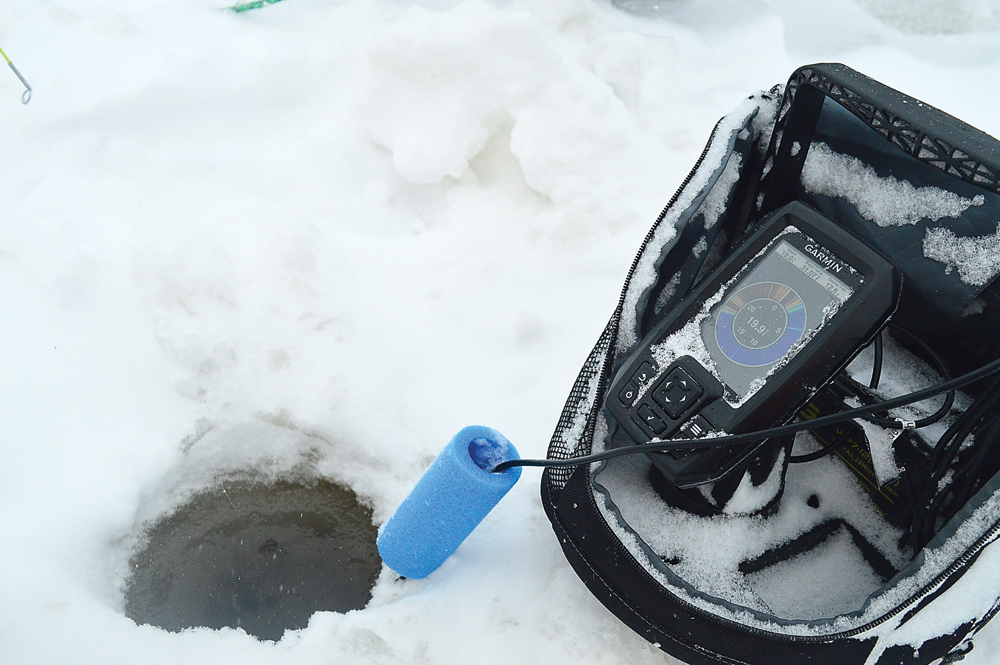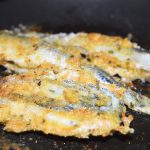Fishing for an answer
- Matthew Whitman stands in the snow as he fishes for smelt on Fish Creek Pond. (Enterprise photo — Aaron Cerbone)
- A line is dropped into a hole in hopes of catching some of the smelt fish below the surface. (Enterprise photo — Aaron Cerbone)
- Three fish, the small fruits of nearly two hours of ice fishing. (Enterprise photo — Aaron Cerbone)
- Smelt get dunked in egg yoke before being breaded and fried. (Enterprise photo — Aaron Cerbone)
- Fried smelt sizzle in the pan. (Enterprise photo — Aaron Cerbone)
- A fish finder sends radar signals into an ice fishing hole, letting anglers know where the fish are. Though there were plenty below the surface, few wanted to take a bite this morning. (Enterprise photo — Aaron Cerbone)
- Matthew Whitman pulls the guts out of a smelt pulled from Fish Creek Pond. (Enterprise photo — Aaron Cerbone)
- Matthew Whitman pulls the guts out of a smelt pulled from Fish Creek Pond. (Enterprise photo — Aaron Cerbone)

Matthew Whitman stands in the snow as he fishes for smelt on Fish Creek Pond. (Enterprise photo — Aaron Cerbone)
TUPPER LAKE — “Why are we here?”
It’s one of the essential mysteries of life, a question facing everyone from time to time.
I asked myself this while sitting out on an icy pond on a cold Sunday morning.
The official answer was to fish for smelt.
The reality was the wind driving snow into my cheeks, my line freezing to the tip of my pole again, and me not having a single fish to show for it. I felt a bit like a kid with nobody to dance with at prom.

A line is dropped into a hole in hopes of catching some of the smelt fish below the surface. (Enterprise photo — Aaron Cerbone)
I had walked out on Fish Creek Pond with Matthew Whitman, an experienced fisherman on ice and on boats, to an area where he had pulled in dozens of smelt before. But this morning they were not hungry, or the weather kept them down, or they really didn’t want me to write an exciting article.
I was there for a story, to give a preview of the sport before Tupper Lake’s Northern Challenge ice fishing derby. The annual event draws hundreds to Tupper Lake, and covering it last year, walking around and talking with the anglers on Simond Pond, made me want to ice fish.
The Northern Challenge is an all-day affair, with each competitor setting up several “tip-ups” to tell them when a fish is on the line with a flag, and waiting in between. This day we were using rods, shorter than a regular fishing rod, with maggots as bait.
Whitman had pulled up three smelt. I thought about how I had been sitting around a hole in the ice for over an hour, fruitlessly dangling that maggot in front of a school of uninterested fish.
—

Three fish, the small fruits of nearly two hours of ice fishing. (Enterprise photo — Aaron Cerbone)
Introspection …
It would be easy to be reductionist and cynical, to write this trip off as a waste of time. It’s harder — but worth it — to find value in failure, to find meaning in a seemingly futile act, to make the best of a bad situation.
Maybe these fish had something to teach me. Ice fishing isn’t exciting, but it is relaxing. It’s easy. It’s slowly engaging.
I used to live my life in terms of emotional peaks and valleys. I viewed it in terms of black and white, happy or sad. Obviously, this is not a healthy mindset to have. My mom remembers when I was young, I’d ask her, “What are we doing today?” — every single morning. (Being home-schooled, my schedule was loose enough to warrant this question.)
When the answer was “nothing” or a sarcastically enthusiastic “school!” I would be disappointed and get moody, to the point that she eventually told me to stop asking the question altogether.

Smelt get dunked in egg yoke before being breaded and fried. (Enterprise photo — Aaron Cerbone)
I sought out fun, and when I didn’t find it, because of my binary worldview, I would become depressive, even angry. Being mad feels good when you’re bored.
Later in college, when I was surrounded by people other than my family all day and was learning to be more of an individual, I came to the conclusion that it is better to be consistently content than fluctuating between happy and sad.
Life is just our perception of the world, so why not perceive it well? Similarly, a fishing trip is what you make of it, so why not enjoy it?
—
… and conversation

Fried smelt sizzle in the pan. (Enterprise photo — Aaron Cerbone)
There’s nothing to do out there while you wait for your line to dip — except talk. So we talked, sharing stories of fishing escapades, work aspirations and good meals.
Whitman has been out on the ice since as early as he can remember. Born on the West Coast, his family moved to Tupper Lake when he was very young, and he started fishing year-round with his dad. He still fishes with his father and has started bringing his daughters, Quinn and Sarah.
Whitman works at the Sunmount day habilitation center, taking multiple overtime shifts a week, and is a member of the Tupper Lake Volunteer Fire Department, trained to enter burning buildings and fight fire from the inside. He is also married with children.
He needs time to relax. Fishing with friends and family is how he gets the chance to unwind. As we fished, he told me stories of pranking other anglers at past Northern Challenges. One man, nicknamed “Eclair,” got his moniker because Whitman hooked his line with one of the pastries when he wasn’t looking, tripped the flag and shouted that he had one on. The man was excited by the weight on the line until he saw he had caught the elusive “eclair fish,” which doesn’t taste very good.
—

A fish finder sends radar signals into an ice fishing hole, letting anglers know where the fish are. Though there were plenty below the surface, few wanted to take a bite this morning. (Enterprise photo — Aaron Cerbone)
Cannibals
Early on, Whitman pulled up a smelt, saying, “We’re on the board.”
He unhooked it and dropped it in a divot in the ice where it thrashed around for a couple minutes as we fished. Eventually, it froze up, and when it stopped moving, Whitman chopped its head off and baited the hooks with bits of the already frozen meat.
To bait smelt, you need smelt. It’s even better than maggots. Smelt are cannibals. Not just, “I’ll eat my own if there’s nothing left” cannibals, but “Oh look! It’s Ralph’s tail! CHOMP!” cannibals.
—
Chill out
People always talk about how busy our world is today, trying to one-up everyone with how busy we are on the hierarchy of busy-ness. Every moment of the day is taken up with work, errands, relationships and, of course, keeping up with family, friends, people you hate, podcasters, politicians, “influencers” and President Donald J. Trump on the social media platform of your choice.
People are looking for any excuse to slow down: watching a couple of episodes of a TV show late at night, meditating at lunch or starting the day with nothing but a cup of coffee.
The difference between these avenues and ice fishing is that the others are pursuits of comfort. Ice fishing forsakes that; it takes place in harsh environments, at early hours, accompanied by the possibility that nothing may happen.
But it is effective.
The mind is given something to do, but not much, the trip can produce a good meal, and no matter what happens later in the day, you’ll be warmer than you were while fishing.
—
Born of desperation?
Ice fishing is not hard. You drill a hole in the ice, drop a line in and wait for a bite. So it is pretty infuriating when you manage to mess that up.
People used to do this for survival when the winter months covered crops and pushed animals deep into the wilderness for hibernation. Ice fishing dates way back to the first time someone was hungry enough to look at a frozen pond and say, “I’ll bet those buggers are getting pretty hungry down there, too.”
Though it is unclear who was the first, people all over the globe — the northern half, that is — have been drilling holes and dropping lines for centuries in Alaska, Norway, Korea and North America.
Actually, dropping lines is more of a modern practice. Indigenous people would hunt using a decoy fish and a spear, throwing it down through the hole and pulling it — and hopefully a fish — back up with a rope tied on its end.
Being out there for an hour with nary a fish and that creeping sense of hungry dread settling in must have been a much more frustrating experience, to put it lightly.
—
Fruits of his labor
We wrapped up around 10 a.m. with three fish, all of them caught by Whitman, who graciously offered them to me and told me how to cook them.
Monday morning I took the fish out of the paper, turned on an oven burner and began cooking up the fruits of Whitman’s labor. I used his recipe: Cover them in egg, flour, then breadcrumbs, and fry them in oil.
I felt a little silly using my largest mixing bowl for one egg and three small fish, but my smaller one met a grisly end earlier that week when I turned on the wrong burner and melted it to the stove.
I tabled them nicely for myself, paired with a fine glass of iced tea. I took my first bite, and the fish melted in my mouth. It was delicious, but more of an appetizer than an entree.
We didn’t really accomplish much on the ice, but we enjoyed each others’ company.
Whitman is training to become a corrections officer in hopes of getting a job at the Federal Correctional Institute in Ray Brook. He may get moved anywhere around the state, though, possibly to areas where he may not be able to ice fish.
We are lucky in the North Country to have cold weather that brings sports that can’t be played elsewhere. If you don’t get the chance to enjoy it, you’ve wasted it, so find your excuse to get out there.
As we pulled the sled off the ice with only a few ounces of fish, the question repeated in my mind: “Why are we here?” And a voice came to answer it: “To enjoy it.”

Matthew Whitman pulls the guts out of a smelt pulled from Fish Creek Pond. (Enterprise photo — Aaron Cerbone)

Matthew Whitman pulls the guts out of a smelt pulled from Fish Creek Pond. (Enterprise photo — Aaron Cerbone)












